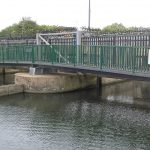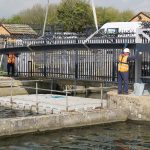ECS Engineering Services utilises FRP to replace aging footbridge
ECS Engineering Services has recently replaced an aging timber pedestrian footbridge, located in Nazeing Marsh near Broxbourne, with a highly durable fibre reinforced polymer (FRP) alternative. Working on behalf of the Environment Agency, the Nottinghamshire based fabrication experts utilised innovative Infracore® Inside FRP technology from Fibercore Europe to design, fabricate and install the new prefabricated footbridge that offers the ultimate in service life and safety.
The decision to replace the 21 metre span Kiora footbridge was taken by the Environment Agency, as the elements had taken a toll on its wooden construction. In order to ensure that the bridge did not pose a risk to the public, the Environment Agency commissioned ECS to provide a durable replacement. As the area is very popular with walkers, a reliable solution was required on a short lead time to minimise potential risk. Having completed a great number of projects of a similar nature as a framework contractor for the agency, ECS was a natural choice.

To begin with, ECS engineers inspected the existing bridge installation to assess elements of the structure that required replacement. The existing concrete supports were deemed to be suitable, but the wooden bridge deck and handrails were in need of urgent attention. ECS proposed the use of an FRP bridge deck coupled with a P4 type parapet hand railing to boost the service life of the structure.
ECS Engineering Services is a distributor of FRP products from Fibercore Europe, which offers a host of benefits when compared to traditional materials. Firstly, FRP is manufactured from mostly recycled materials, offering greater sustainability and cost-effectiveness when compared to virgin materials. It also has an exceptional resistance to corrosion and UV radiation, making it a well suited choice for outdoor applications and incredibly durable when compared to steel or timber. Furthermore, FRP displays high anti-slip properties which makes it ideal for bridge decking, giving users the safety of a sure footing.
FRP from Fibercore Europe however differentiates itself by its utilisation of Infracore® Inside technology. Polymer layers in opposing directions are held together by a continuous structural connection between two outer skins; a construction that provides a strength that surpasses steel and that cannot delaminate. This serves to further increase the service life of FRP beyond the basic aspects of the material. Such characteristics make the material an ideal choice for a pedestrian footbridge to be located in a moist environment, ensuring maintenance requirements and total cost of ownership would be minimal.
Again the inherent benefits of the material helped to reduce lead times. FRP is very easy to fabricate and low in weight, which means a bridge structure can be transported to site as a complete unit or in modules. As a result, time in transit and overall logistical costs are reduced.
An added advantage is also apparent during installation. Manufacture off-site minimises required work on-site, which reduces the impact on the surrounding area. This was vital for the marsh’s eco system – one of the more threatened habitat types in the UK. The outcome was that ECS was able to install the new bridge structure in a single day.
David Searle, ECS Project Manager commented: “FRP fitted the demands of this project as it offered the strength and versatility required to offer a durable turnkey solution. We have worked with the Environment Agency utilising this material in various installations for water control and pedestrian access, as its inherent features make it perfectly suited for environmentally sensitive projects in challenging application environments.”
To further complement the new FRP elements, ECS also installed a 20% sloping ramp at either end of the bridge to improve disabled access. Now all will be able to enjoy the natural surroundings on a sure footing, thanks to the benefits of modern composite materials.
- ECS Engineering Services has recently replaced an aging timber pedestrian footbridge, located in Nazeing Marsh near Broxbourne, with a highly durable fibre reinforced polymer (FRP) alternative.
- ECS Engineering Services is a distributor of FRP products from Fibercore Europe, which offer a host of benefits when compared to traditional materials.







